Mosquito Researchers Maribel Portilla and Olivia Winokur Benefit From Bill Hazeltine Research Awards
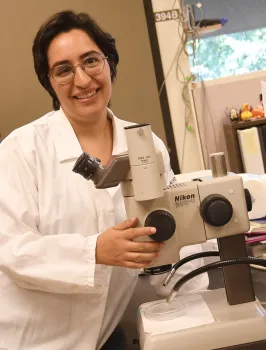
Both are seeking a doctorate at the University of California, Davis. They differ in that Winokur focuses her research primarily on the yellow-fever mosquito, Aedes aegypti, while Portilla's research involves Culex mosquitoes, which transmit West Nile virus and other diseases.
They are alike in that they share the passion of the late William Emery Hazeltine (1926-1994), who worked tirelessly in mosquito research and public health.
Hazeltine, a native of San Jose, was a U.S. Navy veteran who studied entomology at UC Berkeley and received his doctorate in entomology from Purdue University in 1962. He managed the Butte County Mosquito Abatement District, Oroville, from 1966 to 1992, and the Lake County Mosquito Abatement District from 1961-1964.
He was an ardent supporter of the judicious use of public health pesticides to protect public health, remembers Bruce Eldridge, emeritus professor of entomology at UC Davis and former director of the (now folded) statewide UC Mosquito Research Program. Eldridge eulogized him at the 2005 annual meeting of the American Mosquito Control Association (AMCA) as "a man who made a difference." The AMCA journal published his eulogy in its 2006 edition. (See http://entomology.ucdavis.edu/files/154217.pdf)
"Bill was a medical entomologist who had a varied career in the field of mosquito biology and control, but he will forever be remembered as a man who fought in the trenches of the pesticide controversy from 1960 until the end of his life, and who made the safe and efficient use of pesticides in public health a personal crusade," Eldridge said.
In his memory, his three sons--Craig Hazeltine of Scottsdale, Ariz., Lee Hazeltine of Lincoln, formerly of Woodland, and the late Jeff Hazeltine (1958-2013)—established the UC Davis Bill Hazeltine Graduate Student Research Awards, awarding the first one in 1997. Each year they travel to Davis to honor the recipients at a luncheon, timed with their attendance at a scholarship and fellowship celebration, hosted by Dean Helene Dillard, UC Davis College of Agricultural and Environmental Science.
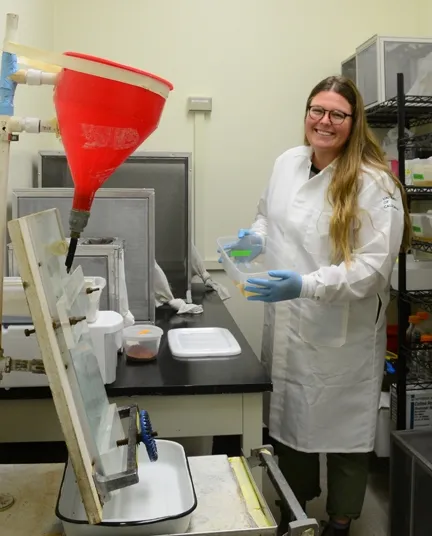
Winokur's funded project: “Identifying Aedes Mosquito Eggs Using Hyperspectral Imaging: a Rapid, Low-Cost, Non-Destructive Method to Improve Mosquito Surveillance and Control.”
Portilla's project: “The Management of Invasive Weeds and their Effects on Larval Culex mosquitoes.”
“Aedes aegypti and Aedes albopictus are mosquitoes capable of transmitting dengue, chikungunya, yellow fever, and Zika viruses,” Winokur explained in her application. “These species are invasive and present in California and continue to spread, increasing the likelihood of local transmission of these devastating viruses. Additionally, Aedes notoscriptus, an Australian mosquito whose vector competence for many viruses is unknown, has been detected in Los Angeles and is likely to spread in the state. Aedesmosquitoes are readily detected using ovitraps, a cheap and effective sampling method to detect the presence of gravid females. Ovitraps are especially useful when mosquito populations are low as traps for adult Aedes are unreliable. Once collected, the eggs cannot be differentiated using a stereomicroscope. Traditionally, identifying Aedes eggs collected in ovitraps requires hatching and rearing to adult for visual identification, which is time consuming and leads to a time lag for control, potentially allowing invasive species to spread without intervention.”
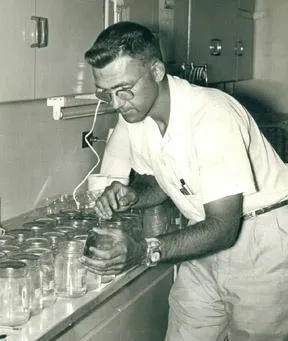
Winokur is testing “the use of hyperspectral imaging to differentiate between eggs collected from lab colonies of native and invasive Aedes mosquitoes in California. Preliminary data indicate this method shows promise for identifying species and warrants further testing. Once I have created species-specific reflectance profiles and validated my identification method using colony eggs, I will collect field eggs and validate the identification method using these field eggs.” She is working with hyperspectral imaging expert Christian Nansen, agricultural entomologist and assistant professor, UC Davis Department of Entomology and Nematology, on the project.
Winokur describes hyperspectral imaging as “a powerful tool that recognizes slight changes; therefore, we need to ensure that all samples are collected and conditioned the same way before testing. Samples must be imaged directly on the oviposition paper because exochorion cells are damaged by the ‘glue' the female uses to attach her eggs to the substrate; imaging removed eggs leads to inconsistent reflectance profiles. This method for rapidly identifying Aedes eggs will allow for quick response to the detection of invasive Aedes mosquitoes.”
Winokur is using the 2017 Hazeltine funds to improve identification of invasive Aedes mosquito eggs in California and to attend the 2017 American Society of Tropical Medicine and Hygiene conference. She is also the newly announced recipient of a 2018 Hazeltine Student Research Award for $3,094, this time to investigate Aedes aegypti immune response to Zika virus.
A native of Long Beach, Calif., Olivia grew up in Laguna Niguel, Calif., where she focused on science at the Dana Hills High School Health and Medical Occupations Academy. She received her bachelor's degree in 2015 from Cornell University, majoring in Interdisciplinary Studies and focusing on the environmental effects on human health. She enrolled in the UC Davis graduate program in 2016 as a Ph.D entomology student with a designated emphasis in the biology of vector-borne diseases. Earlier this year, Winokur received a three-year National Science Foundation Graduate Research Fellowship.
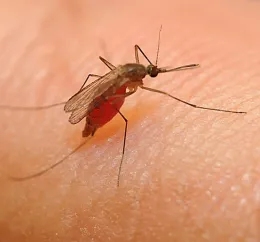
Maribel Portilla, currently writing her dissertation, said the three chapters will encompass: the management practices of the invasive exotic weeds, Brazilian waterweed (Egeria densa) and water hyacinth (Eichhornia crassipes), in the Sacramento-San Joaquin Delta and how those practices impact mosquitoes and their habitat; herbicide use in managing those weeds and how herbicides affects the larval habitat; and the direct effects of herbicides on larval mosquito development.
Her goal: “to inform and create better techniques to reduce both mosquito and weed problems."
Like Winokur, Portilla is grateful for the Hazeltine research funds. “I am currently exploring some molecular/genetic techniques (PCR and sequencing) to identify the species of mosquitoes I collected in the different weed/habitat mesocosms, This will be funded by the Hazeltine award I received.”
Portilla, who calls the South Bay home (San Martin, Santa Clara County), holds a master's degree in public health from UC Berkeley, where “I was able to study health and disease within a larger context, and learned to consider the biological and the social determinants of disease.” Her area of expertise incorporates her love for biology and her strong interest in social issues.
“At UC Berkeley School of Public Health, I was able to study health and disease within a larger context, and learned to consider the biological and the social determinants of disease. As I completed my degree, I realized I really missed the research experiences I had as an undergraduate. So, I looked for a way to bridge my new-found passion for public health and basic science research. This led me to UC Davis, where I learned about One Health and am now pursuing a Ph.D in medical entomology. Medical entomology is a perfect example of a One Health field, where I can seek out how interactions between humans and animals impact health. I am particularly interested in researching how disease risk may change as people manipulate the environment."
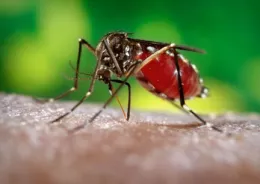
Her academic life revolves around writing her dissertation; teaching UC Davis classes (she's taught entomology, general biology and One Health classes); research; and public outreach. Since 2012, she has mentored some 30 undergraduate students on developing and executing their research experiments. She praised the “the diversity of my interns; they each brought such important and unique perspectives to the project.”
What are her career plans?
“Due to my diverse interests and skill set, I am very open about my career choices. I have extensive teaching experience, and would love to be a professor with both teaching and research opportunities. However, there are many opportunities beyond academia. My research is introducing me to many other ways in which my work and research can help keep people safe and healthy. I hope to develop a strong research skill set while at UC Davis, and find a career path which takes advantage of my diverse abilities and love for One Health and Public Health."
Portilla mentioned pursuing a career as a teacher in a small liberal arts school to teach public health, general biology and global diseases classes, as well as do outreach and research. “I'm more of a scientist than an entomologist,” she said.
Portilla may also pursue a career working in vector-control health education at the county, district or state level. “I'm open at this point,” she said. Overall, she is geared toward improving public health outcomes through healthier environments. “I care about how outcomes affect the larger population,” she said.

“Bill Hazeltine was an advocate for the use of mosquito control to protect people from mosquitoes and the disease agents they transmit, and he believed chemical control to be a necessary part of the means to accomplish this,” wrote Eldridge, who valued his friendship. “He also considered himself an environmentalist, and billed himself as such on his business cards and on his signature block. He had a vast knowledge of pesticides and pesticide legislation, and a strong belief in the scientific basis for public policy issues related to the safe and effective use of pesticides. Because the federal Endangered Species Act influenced mosquito control, he became an authority on this as well."
“After Bill's death, I was contacted by his sons about the possibility of establishing a William Hazeltine Memorial Scholarship Fund at UC Davis,” Eldridge noted. “They believed this would represent an important contribution because of Bill's strong interest and support of medical entomology research, and because of Bill's admiration of UC programs in mosquito control. The fund has grown to the point where graduate student awards can now be funded just from the interest, and a number of students at UCD have benefited from the thoughtfulness of the Hazeltine family.”
The list of recipients:
- 2018: Olivia Winokur (newly announced)
- 2017: Maribel "Mimi" Portilla and Olivia Winokur
- 2016: Sandy Olkowski, Maribel “Mimi” Portilla and Stephanie Kurniawan
- 2015: Sandy Olkowski, Maribel “Mimi” Portilla and Stephanie Kurniawan
- 2014: Martha Armijos, Elizabeth “Lizzy” Glennon and Rosanna Kwok
- 2013: Jenny Carlson, Elizabeth “Lizzy” Glennon and Sandy Olkowski
- 2012: Jenny Carlson, Kelly Liebman and Sandy Olkowski
- 2011: Brittany Nelms Mills, Kelly Liebman and Jenny Carlson
- 2010: Tara Thiemann and Jenny Carlson
- 2009: Kelly Liebman and Wei Xu
- 2008: Ashley Horton and Tara Thiemann
- 2007: Lisa Reimer and Jacklyn Wong
- 2006: Christopher Barker and Tania Morgan
- 2005: Nicole Mans
- 2004: Sharon Minnick
- 2003: Hannah Burrack
- 2002: Holly Ganz and Andradi Villalobos
- 2001: Laura Goddard and Linda Styer
- 2000: Laura Goddard
- 1999: Linda Boose Styer
- 1998: Larisa Vredevoe
- 1997: John Gimnig
